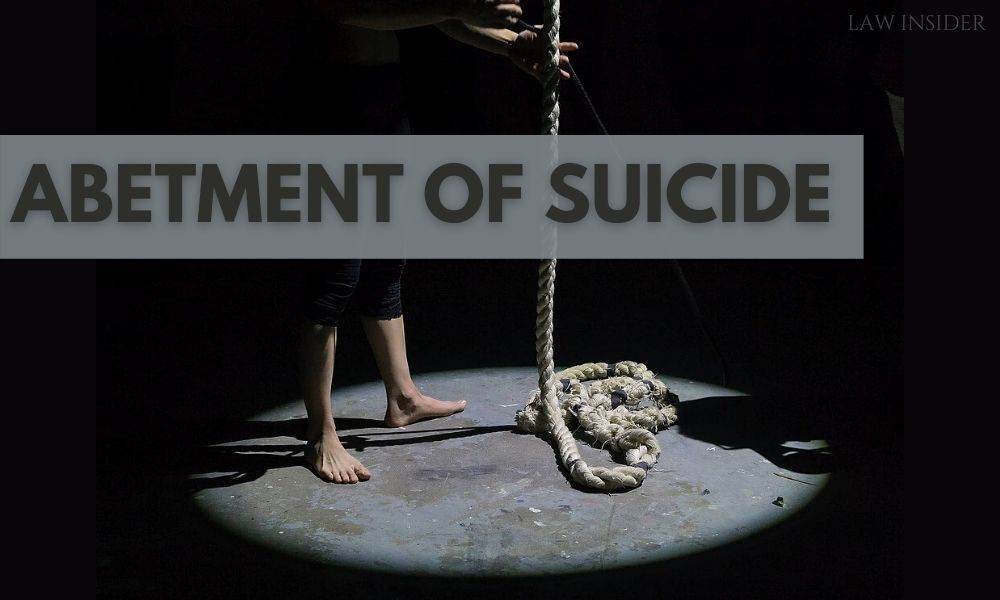
An attempt to commit suicide is punishable under Section 309 of the Indian Penal Code. An abetment to commit suicide has also been made punishable under Sections 305 and 306. Section 305 deals with abetment of suicide specifically for people with a disability. The Indian Penal Code has set a comparatively more severe punishment as compared to cases of abetment of suicide of normal types of persons.
According to Section 306, IPC: Abetment of suicide.—If any person commits suicide, whoever abets the commission of such suicide, shall be punished with imprisonment of either description for a term which may extend to ten years, and shall also be liable to fine.
The offence committed under the Section is of a cognizable nature. It is also non-bailable, non-compoundable. It can be tried by a Court of Sessions. For an offence to fall under Section 306, it is necessary to establish and prove the fact that the death in question was caused as a result of suicide. Medical evidence plays the most critical role here as it can prove whether the death was due to a suicide or due to any other reasons. If the doctor responsible for determining the cause of death as suicide cannot provide a definite opinion, then the accused cannot be convicted under this Section.
The presence of mens rea is absolutely paramount since abetment to suicide entails intentional abetment. When it comes to actus reus i.e. abetment of suicide, there must be instigation for suicide or co-operation in the act by the accused. Intentional assistance is also necessary. Also, the offence of abetment must fulfil the ingredients mentioned in Section 107, IPC. The offence will fall under Section 306 even if an individual helps another in conspiring for committing suicide.
Abettor must be more than a mere spectator. However, in some situations, just the mere presence of the accused might have instigated or encouraged a person to do the deed. In these cases, it is up to the Court to decide whether the presence of the accused resulted in intentional abetment.
It would not be incorrect to cite Section 306 as a valid example of constructive homicide. The constitutional validity of this provision was upheld in Gyan Kaur v. State of Punjab, AIR 1996 SC 946.
An offence sometimes falls both under Sections 306, IPC and Section 498A, IPC (cruelty) even though they constitute different offences. This occurs where as per the facts of a case; a woman was subjected to cruelty and the amount of cruelty left the woman with no option other than to commit suicide. These two provisions have one different constituent: intention. (Ramesh Kumar v. State, (2001) 9 SCC 618)
Sometimes an accused might be convicted under both Section 306 and Section 304B. For an offence to fall under Section 306, it is irrelevant if the cruelty or the harassment was meted out to the victim earlier or soon before her death since the accused will still be held liable under this Section. However, if the cruelty was meted out soon before the victim’s death, then the provision of Section 304B would be invoked. (Pawan Kumar v. State of Haryana, AIR 1998 SC 958)
Case laws:
- Satvir Singh v. State of Punjab (2001) 8 SCC 633 (DB)
- K. Prema Rao v. Srinivas Rao
- Bijoy Uraon v. State of Bihar, 2000 CrLJ 3394 (Pat)
- M.C Narayana v. State (2005) CrLJ 210 (Kant)
Aishwarya Says:
I have always been against Glorifying Over Work and therefore, in the year 2021, I have decided to launch this campaign “Balancing Life”and talk about this wrong practice, that we have been following since last few years. I will be talking to and interviewing around 1 lakh people in the coming 2021 and publish their interview regarding their opinion on glamourising Over Work.
If you are interested in participating in the same, do let me know.
Do follow me on Facebook, Twitter Youtube and Instagram.
The copyright of this Article belongs exclusively to Ms. Aishwarya Sandeep. Reproduction of the same, without permission will amount to Copyright Infringement. Appropriate Legal Action under the Indian Laws will be taken.
If you would also like to contribute to my website, then do share your articles or poems at adv.aishwaryasandeep@gmail.com
We also have a Facebook Group Restarter Moms for Mothers or Women who would like to rejoin their careers post a career break or women who are enterpreneurs.
We are also running a series Inspirational Women from January 2021 to March 31,2021, featuring around 1000 stories about Indian Women, who changed the world. #choosetochallenge
